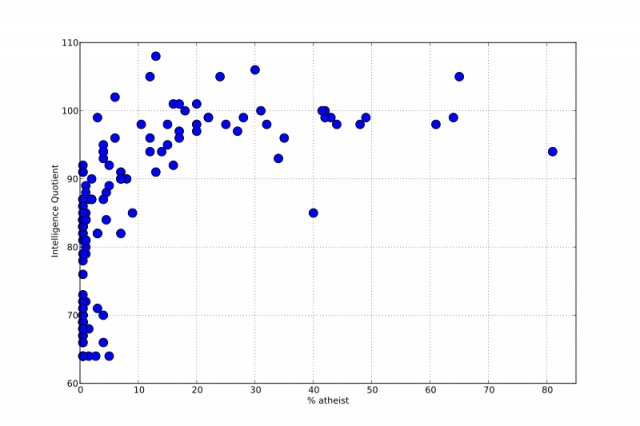New meta-analysis checks the correlation between intelligence and faith [View all]
First systematic analysis of its kind even proposes reasons for the negative correlation.

The relationship between countries' belief in a god and national average IQ.
by Akshat Rathi - Aug 11 2013, 6:30pm EDT
More than 400 years before the birth of Jesus of Nazareth, Greek playwright Euripides wrote in his play Bellerophon, “Doth some one say that there be gods above? There are not; no, there are not. Let no fool, led by the old false fable, thus deceive you.”
Euripides was not an atheist and only used the word “fool” to provoke his audience. But, if you look at the studies conducted over the past century, you will find that those with religious beliefs will, on the whole, score lower on tests of intelligence. That is the conclusion of psychologists Miron Zuckerman and Jordan Silberman of the University of Rochester and Judith Hall of Northeastern University, who have published a meta-analysis in Personality and Social Psychology Review.
This is the first systematic meta-analysis of 63 studies conducted in between 1928 and 2012. In such an analysis, the authors look at each study’s sample size, quality of data collection, and analysis methods, then account for biases that may have inadvertently crept into the work. This data is next refracted through the prism of statistical theory to draw an overarching conclusion of what scholars in this field find. “Our conclusion,” as Zuckerman puts it, “is not new.”
“If you count the number of studies which find a positive correlation against those that find a negative correlation, you can draw the same conclusion because most studies find a negative correlation,” added Zuckerman. But that conclusion would be qualitative, because the studies’ methods vary. “What we have done is to draw that conclusion more accurately through statistical analysis.”
http://arstechnica.com/science/2013/08/new-meta-analysis-checks-the-correlation-between-intelligence-and-faith/
Here's the abstract. The study is behind a firewall.
http://psr.sagepub.com/content/early/2013/08/02/1088868313497266
I can't wait for some intelligent responses.